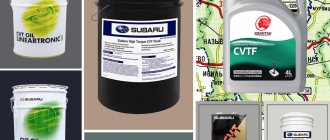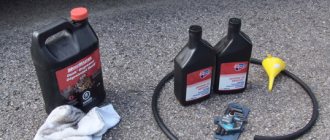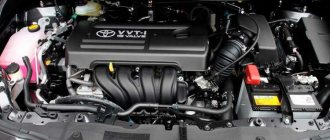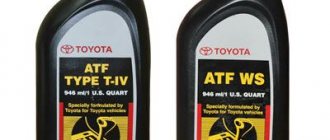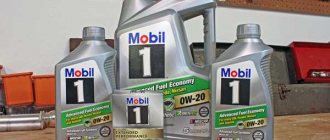What is a transfer case?
The transfer case is an integral part of an all-wheel drive vehicle. It is designed to distribute torque along the axles of the vehicle, as well as to increase torque when driving off-road and on bad roads.
Depending on which all-wheel drive system is installed on the vehicle, the design of the transfer case differs. However, each of them has common elements:
- Front and rear axle drive shafts
- Chain/gear and reduction gears
- Center differential with locking mechanism
- Drive shaft
The drive shaft serves to transmit torque from the gearbox to the transfer case. The center differential distributes torque between the axles and allows them to rotate at different angular speeds. Such a node can be symmetrical (distributes the moment equally) and asymmetrical (distributes it in a certain ratio).
In cars where all-wheel drive is activated automatically or manually, a center differential is usually not installed.
The center differential lock allows you to fully realize all-wheel drive capabilities. It means partial or complete disengagement of the differential, which ensures a rigid connection between the front and rear axles. Blocking can be done either manually or automatically.
Manual shutdown is carried out using a hydraulic, mechanical, electric or pneumatic drive. Today, the automatic locking mechanisms used are viscous coupling, Torsen limited-slip differential and multi-plate friction clutch. There are designs that provide both of these options.
The chain drive consists of a drive and driven sprocket, as well as a chain. It serves to transmit torque from the rear axle to the front. Instead of a chain drive, the transfer case can also use a spur gear. A bevel gearbox is usually installed if the all-wheel drive system is automatically connected.
A reduction gear increases torque when driving off-road and on bad roads. It is installed on individual transfer case structures of off-road vehicles. Modern vehicles are equipped with a planetary gearbox.
When should you change the oil in the transfer case?
Not all car owners know, but axles and transfer cases need periodic replacement of lubricant. During operation, the oil becomes contaminated with mechanical wear products, which over time leads to abrasive wear of surfaces and failure of the transfer case.
By periodically checking the condition of the lubricating fluid, you can quite accurately determine what condition it is in and whether it needs to be replaced with a more recent material. Also, during a normal visual inspection, oil leaks can be detected.
Changing the oil in the transfer case must be carried out strictly according to the regulations established by the manufacturer. Usually it is about 20-40 thousand kilometers. With regular checking and replacement of the lubricant, the transfer case can last quite a long time.
Some automakers claim that the transfer case is filled with oil for its entire service life. This statement is true only if you plan to scrap the vehicle in 3-5 years and buy a new one. Therefore, even in such cars the oil should be changed, otherwise you may end up with expensive repairs or an even more expensive replacement of the transfer case.
DIY replacement tips
- Changing the oil in the transfer case should be carried out within 10-15 minutes after a trip of at least 5-10 km. During operation, the oil heats up and becomes thinner, which makes it drain better.
- On most cars, the drain and filler holes are made “square”, so to unscrew you only need a ratchet or a wrench of the appropriate size. Of course, this is provided that the bottom is not covered with anther, which will need to be dismantled before replacement.
- The accompanying tool will most likely require a hydraulic syringe for technical fluids. In some cars, using a container with a “spout” allows you to replace it without a syringe.
- On most transfer cases, it is considered normal when the level is slightly below (5-10 mm) the filler hole. You can determine the actual amount of oil poured with your finger or a piece of bent wire. To speed up the process of self-replacement, you can add oil until it flows out of the level control hole - this will not harm the transfer case or rear axle at all.
How to check the oil level in the transfer case?
There are no inspection windows for checking the level and condition of the transfer case oil, so control and replacement can only be done through the filler hole.
Before checking, the car must be placed on a flat surface and the filler bolt, or, if present, the control bolt must be removed. Usually they are unscrewed with four or hex keys, or regular wrenches.
The normal oil level is just below the inspection or filler hole. The need for replacement is determined visually. To do this, take a small amount of oil with a syringe with a flexible tube. If the oil is cloudy, black and contains traces of wear, it should be replaced.
How to choose oil?
Transmission oil is poured into the transfer case. It is selected based on the climatic conditions in which the car is operated.
There are two main classifications for such fluids: SAE J306 and API GL.
SAE J306 is a classification of lubricating fluids for drive axles, transfer cases and manual transmissions based on viscosity. It shows the dependence of oil viscosity on temperature changes. Thanks to modern production technologies, you can safely use all-season oils. If the name of a liquid contains the letter W, this means that it is all-season. The most common oils are 75W-90, 80W-90, 75W-85. The first number indicates viscosity at low temperatures, and the second number at high temperatures.
The API GL classification divides oils into quality classes, which depend on the basic performance properties of the formulations. These classes are determined by how anti-foam, anti-wear, anti-oxidation additives and corrosion inhibitors work. The minimum class of fluids that can be used in transfer cases is API GL-3. API GL-4 oils are suitable for distributors of most foreign cars and all domestic cars. API GL-5 fluids are intended for hypoid gears, drive axles and transfer cases of modern passenger vehicles.
If in winter the temperature drops below -30 °C, it is recommended to use 70W oils. Liquids with a low temperature rating of 75W can also be poured, but at very low temperatures it will be too thick. In temperate latitudes, 75W and 80W oils can be used. Considering the high-temperature indicator, oils of 80 and 90, for example 75W-90, are suitable for civilian SUVs and cars.
What and how much to fill
The table below will allow you to select oil by car brand and find out how much is required.
| Automobile | Oil | Volume (l) |
| AUDI | ||
| audi q7 (audi q7) | G052162A2, 4014835712317 Ravenol ATF 5/4 HP | 0,85 |
| BMW | ||
| BMW x5 e53 (bmw x5 e53) | BMW 83 22 9 407 858 "ATF D-III, ATS-500 83220397244 | 1 |
| BMW x5 e70 (bmw x5 e70) | 83 22 0 397 244, Multi DCTF, Motylgear 75W80 | 1 |
| BMW x3 e83 (bmw x3 e83) | 83229407858 | 1 |
| BMW x3 f25 (bmw x3 f25) | BMW Verteilergetriebe 4WD TF 0870 (83 22 0 397 244) | 0,6 |
| GAS | ||
| gas 66 | TAp-15V, TSp-15K, TSp-Mgip, 80W90 Gl-4 | 1,5 |
| GREAT WALL | ||
| Great wall hover | Dexron III | 1,6 |
| JEEP | ||
| Jeep Grand Cherokee | Mopar 05016796AC | 2 |
| INFINITI | ||
| Infiniti fx35 (Infiniti fx35) | Nissan Matic D - KE908-99931 | 2 |
| KAMAZ | ||
| KAMAZ 43118 | TSp-15K | 5,4 |
| KIA | ||
| Kia Sorento | Dexron II, III (IDEMITSU Multi ATF, GT ATF TYPE Multi Vehicle IV) | 2 |
| Kia Sorento 2 (kia sorento 2) | Castrol Syntrax Universal Plus 75W90, RAVENOL TGO 75W90 | 0,6 |
| Kia Sportage 1 | API GL-5 SAE 75W-90 | 1 |
| Kia Sportage 2 | 75W90 GL-5 (Mobil Mobilube HD 75W90 GL-5, Castrol 4008177071768 "Syntrax Longlife 75W-90) | 0,8 |
| Kia Sportage 3 | HYPOID GEAR OIL API GL-5, SAE 75W/90 | 0,6 |
| Kia Sorento TOD | Shell Spirax S4 ATF HDX, MOBIL ATF LT 71141 | 2 |
| Kia Sorento Part-Time | ATF Dexron III | 2 |
| RANGE ROVER | ||
| Land Rover Discovery 3 | SAF-XO 75W-90, Syntrax Longlife 75W-90 | 1,5 |
| Land Rover Discovery 4 | Tl7300-Shell Tf0753 | |
| Land Rover Freelander 2 | API GL5, SAE 90 | |
| Land Rover Defender | 75W-140 GL-5 | 2,3 |
| LEXUS | ||
| Lexus rx300/330 (Lexus rx300/330) | 85W-90, CASTROL TAF-X 75W-90 | 1 |
| MERCEDES | ||
| Mercedes GLK (Mercedes-Benz GLK-Class) | dispenser in a box | |
| Mercedes ml 163 (mercedes ml 163) | 236.13 #A001989230310, Motul Multi ATF | 2 |
| Mercedes w163 (Mercedes-Benz w163) | A 10 | 1,5 |
| Mercedes w164 (Mercedes-Benz w164) | A0019894503 | 0,5 |
| MAZDA | ||
| mazda cx 5 | GL-5 80W-90, MOBIL Mobilube HD 80w-90 GL-5 | 0,5 |
| mazda cx 7 | 80W90 API GL-4/GL-5 | 2 |
| MITSUBISHI | ||
| Mitsubishi Pajero Sport | Castrol TAF-X 75W-90 | 3 |
| Mitsubishi Outlander 3, xl (mitsubishi outlander 3, xl) | 80W90 GL-5, 75W90 GL-5 | 0,5 |
| mitsubishi l200 (mitsubishi l200) | GL-3 75W-85, GL-4 75W-85 | 2,5 |
| Mitsubishi Pajero 2 (mitsubishi pajero 2) | 75W85GL4 | 2,8 |
| Mitsubishi Pajero 3 (mitsubishi pajero 3) | GL-5 80W-90, Castrol Syntrans Transaxle 75W-90 | 3 |
| Mitsubishi Pajero 4 (mitsubishi pajero 4) | ENEOS GEAR GL-5 75W-90 | 2,8 |
| Mitsubishi Montero Sport | Castrol TAF-X 75W-90 | 3 |
| Mitsubishi Delica | 75W90 Gl-4 | 1,6 |
| NIVA | ||
| Niva 2121/21213/21214 (VAZ 2121/21213/21214) | Lukoil TM-5 (75W-90, 80W-90, 85W-90), TNK Trans Gipoid (80W-90), Shell Transaxle Oil (75W-90) | 0,8 |
| NISSAN | ||
| Nissan x trail t31 (nissan x trail t31) | Nissan Differential Fluid (KE907-99932), Castrol Syntrax universal plus 75w90 GL-4/GL-5 | 0,35 |
| Nissan Qashqai | NISSAN Differential Fluid SAE 80W-90 API GL-5 | 0,4 |
| Nissan Pathfinder r51 (Nissan Pathfinder r51) | Nissan Matic-D, Dexron III | 2,6 |
| Nissan Terrano | SAE75W90 GL-4, GL-5 | 2 |
| Nissan Teana | GL-5 80W90 | 0,38 |
| Nissan Murano z51 (Nissan murano z51) | Genuine NISSAN Differential Oil Hypoid SuperGL-5 80W-90 | 0,3 |
| OPEL | ||
| Opel Antara | GL-5 75W90 | 0,8 |
| Opel Mokka | GM 93165693, MOBILUBE 1 SHC 75W-90, Motul GEAR 300 75W-90 | 1 |
| PORSCHE | ||
| Porsche Cayenne Hang-on | Shell TF0870, RAVENOL Transfer Fluid TF-0870 | 0,9 |
| Porsche Cayenne Torsen | Castrol BOT 850, Burmah BOT 850 | 0,9 |
| RENAULT | ||
| Renault Duster 2.0 4x4 (renault duster 2.0 4x4) | Elf TransElf Type B 80W90 | 0,75 |
| Renault Koleos | Elf TransElf Type B 80W-90, Total Transmission rs fe 80w-90 | 1,5 |
| SUZUKI | ||
| Suzuki Escudo | SAE 75W-90, 80W-90 API GL-4 | 1,7 |
| Suzuki Grand Vitara | 75W-90 API GL-4, SAE 80W-90 API GL-5 | 1,6 |
| Suzuki CX4 | TAF-X | 0,6 |
| SSANGYONG | ||
| SsangYong Kyron (automatic transmission) | Dexron IID, III | 1,3 |
| SsangYong Kyron manual transmission | 80W90 API GL-4/GL-5 | 1,4 |
| SUBARU | ||
| Subaru Forester | no transfer case, reduction gear in the box | |
| TOYOTA | ||
| Toyota Hilux | API GL3 75W-90 | 1 |
| Toyota Land Cruiser Prado 120/150/200 | GL-5 75W90 Toyota Gear oil | 1,4 |
| toyota rav 4 | Toyota Synthetic Gear Oil API GL4/GL5, SAE 75W-90 | |
| Toyota Highlander | LT 75W-85 GL-5 TOYOTA | 0,5 |
| UAZ | ||
| UAZ Patriot | SAE 75W/90 according to API GL-3, TSp-15K, TAP-15V, TAD-17I | 0,7 |
| UAZ 469 | TAD-17, 80W90 Gl-5, 85W90 GL-5 | 0,7 |
| UAZ Hunter | SAE 75W/90 according to API GL-3 | 0,7 |
| URAL | ||
| Ural 4320 | TSp-15K | 3,5 |
| FORD | ||
| Ford explorer 2013 (ford explorer 2013) | Motul 75w140 | 0,4 |
| ford kuga | SAE 75W-90 | 0,5 |
| ford kuga 2 | SAE 75W140 | 0,4 |
| Ford Maverick | SAE 75W140 | 2 |
| Ford Explorer 5 | SAE 75W140 (Castrol Syntrax Limited Slip 75w140) | 0,4 |
| VOLKSWAGEN | ||
| Volkswagen Amarok | G052533A2, Castrol Transmax Z | 1,25 |
| Volkswagen Touareg | VAG G052515A2, Castrol Transmax Z | 0,85 |
| Volkswagen Tiguan | G 052 145 S2 | 1 |
| HYUNDAI | ||
| Hyundai ix35 (Hyundai ix35) | 75W90 | 1 |
| Hyundai Santa Fe 2.7 (Hyundai Santa Fe 2.7) | Shell Spirax AXME 75W90 | 1 |
| Hyundai Tucson | 80W90 GL-4/Gl-5 (Shell Spirax S3 AX 80W-90), 75W90 GL-5 (Сastrol Syntrax Universal 75W-90) | 0,8 |
| HONDA | ||
| Honda CR-V | transfer case combined with gearbox | |
| CHEVROLET | ||
| Chevrolet Niva | 80W-90 GL-4, 75W-90 | 0,8 |
| Chevrolet Captiva | GL-5 75W90 | 0,8 |
| Chevrolet Tahoe | Dexron VI (GM Dexron 6, Spirax S3 ATF MD3, Chevron ATF MD3, AC Delco auto trak II) | 2 |
| Chevrolet TrailBlazer | GM Auto-Trak II | 2 |
